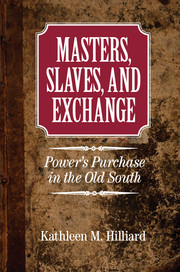4 - Black Markets
Published online by Cambridge University Press: 05 June 2014
Summary
Richard Eppes was a meticulous man. A proponent of agricultural reform and a medical doctor, the Virginia slaveholder managed three tidewater grain plantations, overseeing a workforce that, by the beginning of the Civil War, had grown to over a hundred slaves. In addition to plantation journals and account books, Eppes kept a diary, memorializing the mundane details of daily management and expounding his own theories of profitability and social control. In particular, Eppes expressed concern for the moral character of his workforce and outlined regulations that, he thought, best promoted its welfare. In what was an annual tradition, Richard Eppes gathered slaves together for a prepared address, imparted the plantation rules, reviewed the community’s accomplishments and failings, and outlined his vision for the upcoming year. Eppes explained to his slaves that he regarded them as “human beings possessing faculties similar to our own and capable of distinguishing between right and wrong” and expected them to obey the laws he decreed. The first, and presumably most important regulation addressed the problem of theft: “You shall not steal from your master, overseer, fellow servants, or neighbors.” The first offense merited ten strokes of the whip; a second (occurring in the same month), twenty-five strokes; and a third, thirty-nine lashes and a shaved head.
But this simple declaration of laws and expectations often failed to suffice and, in 1853, Eppes took special care to address the issue of theft among members of the gathered community. He said:
I have not spoken of stealing, for I hope we never shall hear any more of that on this plantation as you ought to know. It is to the interest of one & all of you to keep out of such scrapes but I have to ask of you if a chicken or an egg or your provision is stolen, to go and tell Mr. Rogers immediately and he will try and find out the rogue and he will surely be punished. Should we loose hogs sheep corn or other things off the plantation and the rogue cannot be detected or found out then the whole population must suffer, a day for a hog or sheep or barrel of corn, of your Christmas hollodays will be taken off until we have taken the whole when we will find out some other punishment.
- Type
- Chapter
- Information
- Masters, Slaves, and ExchangePower's Purchase in the Old South, pp. 94 - 131Publisher: Cambridge University PressPrint publication year: 2013



